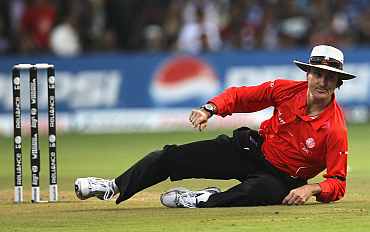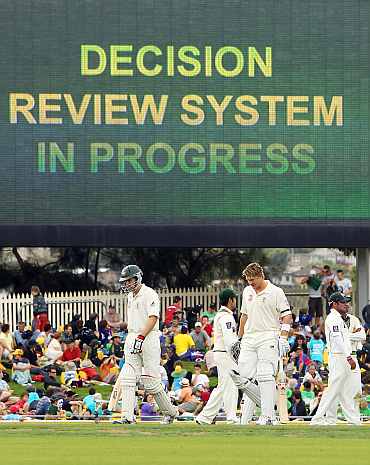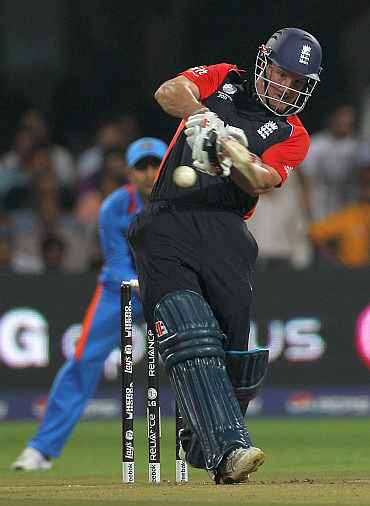 | « Back to article | Print this article |
Why the umpire's decision must be final!
Not since Sachin Tendulkar's dubious LBW decision in Australia by Daryl Harper has any decision caused as much furor as Ian Bell's decision on Sunday.
Skipper Mahendra Singh Dhoni added the latest word to the cricket lexicon: Adulteration.
Adulteration of technology with human intention that apparently caused the decision to go against his team.
So hang on, let's not try and answer Dhoni's caustic yet pertinent questioning of how 2.4 metres declares a batsman out while 2.5 keeps him safe.
Those petite numbers are better suited to track and field events.
Why is Umpiring in decline?
Whether it's the shockingly amateurish approach of umpires standing in the 2007 World Cup final or the decision by Billy Bowden at Bengaluru on Sunday; the state of affairs in the umpiring world seems to be grim.
The International Cricket Council needs to take responsibility for the decline and act assertively.
Agreed that the ICC has an extensive programme to create the best possible environment for umpires to flourish and they are handled as carefully as pilots on long haul flights (at least some airlines still do).
But finding quality talent first up is more important than nurturing it. Why doesn't the ICC question cricket-playing nations, which fail to throw up quality umpiring talent once every few years?
Isn't it time that the ICC takes responsibility for umpiring standards and sets it right. Once that happens, the quality of decisions and the course of matches will not pivot around decisions that we saw on Sunday as rampantly as they are right now.
Remember things do not change, we do.
Force the umpire to be aware of his responsibility
The ICC needs to go back to using technology only for line decisions; whether that's for stumpings or run outs or no balls.
For everything else they need to turn to the on-field umpire unchallenged.
That will retain the character of the game; force the umpire to be more judicious and aware of his responsibility.
They need to back the umpire and assure him that a decision against a powerhouse nation/team/player will not mean the end of his career.
No one wants a Darrell Hair treatment again.
If such sophisticated technology is still proving indecisive, then it's helping no one's cause.
There is no point in using technology and then have the third umpire merely suggest to the on-field umpire about the event. That to my mind confuses the on-field umpire even more.
Let us put integrity back into the sport
Maybe the ICC may find a willing sponsor for that.
Incorrect decisions have cost teams trophies and tough defeats, but then that is the nature of the sport. Every cricketer deep down admits to have benefitted and lost out to a wrong decision in his career.
So -- as idealistic as it might sound -- let us instead put integrity back into the sport and leave it to the fielder to acknowledge if he took a catch fairly or if he didn't.
Let's make batsmen walk when they have feathered the ball with their bats.
If they are genuinely unsure, let's give the benefit of doubt to the batsman. That will ease up the pressure on the umpire and keep the sanctity of his office unharmed.
Why didn't Strauss walk?
For a team that plays every year at the MCC and heralds the spirit of cricket, that's a pretty bad example to set.
I recall a chance encounter with former Indian captain and umpire S Venkatraghavan who had some very valid points to make on the use of technology.
That conversation got me to do a Rediff diary and come to think of it, there are many suggestions there that still might save cricket a few blushes.




